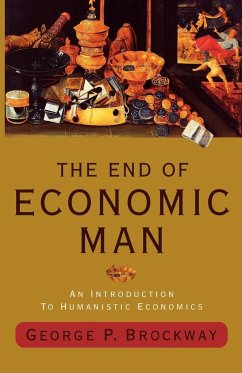When Adam Smith pioneered modern economics in the eighteenth century, it was a branch of philosophy. By the close of the nineteenth century, economists had discovered the usefulness of mathematical tools from classical mechanics, and by the end of the twentieth visions of clicking pool balls reigned supreme. Except for one insightful critic: George Brockway. First writing for The New Leader and then in this seminal text, Brockway skewered mainstream economists who assumed away the free will of participants in the economy. This book establishes an economics in which men and women are not ceramic spheres subject only to cold, mathematical forecasts, but free human beings who are responsible for their actions and can find in this critical supposition the foundations of mores, morals, and morale. Now thoroughly revised, it is for anyone who has suspected that the economy is too important to be left to economists.
Hinweis: Dieser Artikel kann nur an eine deutsche Lieferadresse ausgeliefert werden.
Hinweis: Dieser Artikel kann nur an eine deutsche Lieferadresse ausgeliefert werden.








